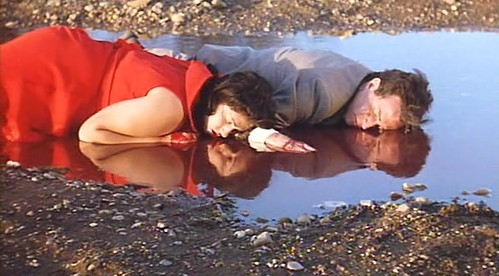Whisky introduces the repetition of the characters, which is easily broken by the end of the film. The cinematography adds to the solace to the film, brings the characters together when they go on vacation. The way the routine is broken suggests that maybe Marta left to be with Herman, or find herself a better place instead of the dull life she lived before.
Monday, October 26, 2015
Whisky (Juan Pablo Rebella, Pablo Stoll, 2004)
Whisky is a charming film about a sock factory owner, Jacobo, asking his employee, Marta, to be his pretend wife for the weekend, while his brother, Herman, comes to town. Jacobo's silent character looms over the film, while he watches Marta and Herman get closer in their friendship. Herman, an established sock factory owner in another city, has always had the better life of the two brothers.
Profundo Carmesí ( Arturo Ripstein,1996)
Profundo Carmesí (Deep Crimson) is a black comedy film about a Coral Fabre, who falls in love with Nicolas Estrella, who preys on women for a living. Coral's controlling personality means that Nicolas has no other choice but to listen to her wishes. Coral becomes in charge of who he preys on, and together they commit the crimes.
In this Mexican crime film, I was surprised at how humorous this film was but also at how serious and horrifying it was. Profundo Carmesí shows the main characters' demented personalities, all the while bringing hope for the two people to find love together. I thought it was interesting that Ripstein had cast a female actress who was not thin. It seems that all criminal women in films follow this unspoken rule to be thin. With Nicolas being balding and wearing a toupee, Profundo Carmesí addresses the topic of body issues, and how both main characters are accepting of their problems.
In this Mexican crime film, I was surprised at how humorous this film was but also at how serious and horrifying it was. Profundo Carmesí shows the main characters' demented personalities, all the while bringing hope for the two people to find love together. I thought it was interesting that Ripstein had cast a female actress who was not thin. It seems that all criminal women in films follow this unspoken rule to be thin. With Nicolas being balding and wearing a toupee, Profundo Carmesí addresses the topic of body issues, and how both main characters are accepting of their problems.
Monday, October 5, 2015
Terra Estrangeria (Walter Salles, 1996)
Set during the controversial political chaos of Brazilian President Fernando Collor de Mello, who froze all banks accounts on March 15, 1990, the audience is introduced to Paco. Paco is a student, yearning to be an actor, and lives with his mother in Brazil. After Paco's mother's death, he decides to leave Brazil in hopes of seeing his mother's home town, San Sebastian, Spain.
Paco gets to Spain by smuggling in diamonds from Igor, a business entrepreneur who sells stolen gems. Paco meets Alex, a waitress, who has connections with Igor. Fate brings Paco and Alex together as they find their way back home, with the company of each other.
I loved the cinematography of this movie- it was really well done and it was so beautiful. I think the film does a great job at addressing the topic of transnational identity. Alex was Brazilian, but came to Spain to find her home. She couldn't quite assimilate to the culture- she makes a comment that her accent is always noticed.
I think that Paco's voyage to his home land is an interesting story line as well. He's trying to bring that peace to his mother, and he wants to visit San Sebastian for her, but once he is shot, the audience doesn't know whether he makes it there or not. The ending scene, with the car moving down the road was a great ending to this movie.
Thursday, October 1, 2015
Rodrigo D: No Futuro (Víctor Gaviria, 1990)
Rodrigo D: No Futuro features Rodrigo and his friends in Medellin, Columbia. Living in the slums, Rodrigo and his friends steal, carjack, start fights, and at one point, shoot someone. Rodrigo's heart is with punk music, and he wants to start his own punk band. In one scene, Rodrigo and his friends are on a rooftop, practicing punk music.
The film's gritty and neorealistism is what makes this film so great. Gaviria creates Rodrigo's character as angry and destructive, which falls in line to the music he listens to. Medellin is notorious for its crime, and I thought it was really interesting that Gaviria cast the movie with local teenagers, only so that they could live their life to some standards before the city swallowed them up.
Subscribe to:
Comments (Atom)



